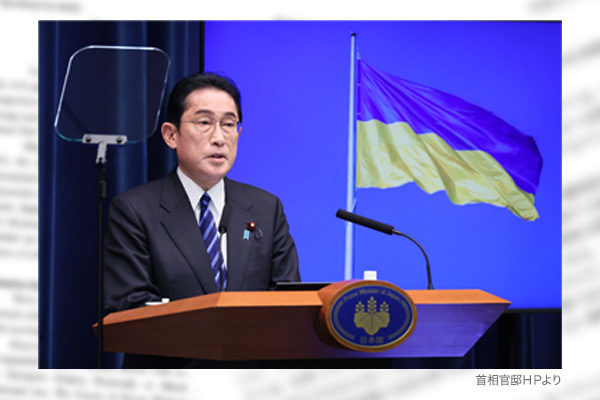After U.S. President Joe Biden and Italian Prime Minister Giorgia Meloni visited Kyiv in February, Japanese Prime Minister Fumio Kishida is the only Group of Seven leader who has not visited Ukraine since the Ukraine war broke out one year ago. Kishida has explored an opportunity to visit Kyiv but has failed to find it. He is set to chair an annual G7 summit in Hiroshima in May, where the Ukraine crisis is expected to top the agenda. As far as he has no courage to visit Kyiv, however, his discussion of peace or nuclear abolition may not be persuasive.
A visit to Kyiv is symbolically significant for demonstrating willingness to stand in solidarity with Ukraine to fight against Russian aggression. In the event of a Taiwan crisis, it is doubtful if Western countries would help Japan with a leader failing even to visit Kyiv.
Lingering presence of one-country pacifism
“I am considering [a Kyiv visit] in light of safety, secrecy and other conditions,” Kishida simply said at a news conference on February 24. Kenta Izumi, leader of the Constitutional Democratic Party of Japan, the largest opposition party, doubted if Kishida would have to visit Kyiv in secrecy, saying that he has an option to visit Ukraine openly after getting approval from the parliament. Debate in Japan deviates from realities in the international community, indicating the lingering presence of “one-country pacifism” under which people feel good if only their country is in peace and safe.
In a bid to break away from the postwar regime represented by the one-country pacifism, the Japanese government under then Prime Minister Shinzo Abe developed a national security legislation to authorize the limited exercise of collective defense rights. Prime Minister Kishida followed with revising Japan’s three security documents including National Security Strategy and deciding a substantial defense spending increase last December. This should be highly appreciated. But his handling of a Ukraine visit might indicate his reversion.
Take leadership in deterring nuclear attacks
Kishida has chosen Hiroshima as the venue for the coming G7 summit. Hiroshima, his hometown, was hit by a U.S. atomic bomb to which civilians including Kishida’s relatives were exposed. Kishida, though grown up in Tokyo, used to visit Hiroshima every summer to spend August 6 or the atomic-bomb day there. “My grandmother Kazuko told me at her knees of the calamitous event in Hiroshima on that day, though I did not ask her to,” Kishida writes in his book “Toward a World without Nuclear Weapons.” Kishida intends to heighten the international momentum toward nuclear abolition by inviting the other G7 leaders to Hiroshima.
However, the world now faces a critical situation where nuclear weapons could be used at any time. The front line of the crisis is none other than Ukraine. Kishida should personally look at realities in Ukraine exposed to Russian President Vladimir Putin’s nuclear intimidation. Kishida is responsible for taking leadership in deterring nuclear attacks, if not withdrawing the goal of nuclear abolition, to prevent any event like the Hiroshima and Nagasaki nuclear disasters occurs again.
Takashi Arimoto is a Planning Committee member at the Japan Institute for National Fundamentals and publisher of Monthly Magazine SEIRON at the Sankei Shimbun newspaper.


